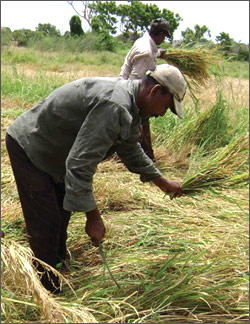Better technology in farming will boost Eastern growth
Continued from yesterday
Policy implications
There is immense potential for agriculture in the East, which has
seen little or no growth in the past 10 years. . If the kind of
increases in revenue seen in Visvalingam’s vegetable farm could be
replicated throughout the Eastern Province, over Rs. 5 billion in new
income could be earned. This would raise its GDP by nearly 4.4%. This in
turn would raise Eastern GDP growth rates from 10.2% to nearly 15.7%.
 Moreover, if Visvalingam’s success in increasing yield on his quarter
acre of onion could be matched, the Eastern Province would supply an
additional 3,200 MT. Similarly, with increased production of other crops
like chillie, brinjal, potatoes, ground nut etc. on the 89,000 acres of
vegetable lands and home gardens some headway would be made towards
reducing the Rs. 61 billion spent on vegetable imports every year. Moreover, if Visvalingam’s success in increasing yield on his quarter
acre of onion could be matched, the Eastern Province would supply an
additional 3,200 MT. Similarly, with increased production of other crops
like chillie, brinjal, potatoes, ground nut etc. on the 89,000 acres of
vegetable lands and home gardens some headway would be made towards
reducing the Rs. 61 billion spent on vegetable imports every year.
But the feasibility in this lies in good marketing and higher
productivity. It is only if those vegetable products are cheaper than
imports or at the least the same price as produce of the rest of Sri
Lanka and of the same quality. For this, farmers in the East must
embrace higher productivity investments like micro-irrigation to reduce
costs and increase efficiency. Equally, they need the help of the
private sector and government agencies to link up with lucrative markets
at home and abroad.
A major constraint that would stand in the way of a scaling up such
technology is the lack of access to finance that these farmers are faced
with. After seeing the benefits of introducing new techniques, farmers
will become extremely frustrated if they cannot gain the requisite
capital, at concessionary lending rates, to set it up. For this, state
development banks like Lankaputhra Bank should set up operations in
these regions without delay, and take the lead in rolling out a
broad-based micro-finance scheme.
Insights from UNIDO
An important insight from this project was the importance of
employing scientific techniques when deciding the technicalities of a
certain development intervention. A previous project elsewhere in
Batticaloa had simply installed a generic sprinkler system, not
undertaking a scientific analysis on the soil conditions and sprinkler
suitability. Therefore it had failed.
This sort of ad-hoc intervention causes a loss of confidence among
farmers, who may be reluctant to undertake similar projects in the
future.
The UNIDO project solicited the expertise of an international expert
who analysed the soil and scientifically selected the best sprinkler for
the job.
Another key learning is how the project involved local agricultural
officers and village societies from the onset. This ensured not only
sustainability and ‘local ownership’ of the project, but also ensured
that if other farmers wished to come onboard later on, there was ample
local capacity and expertise to advise them.
One important obstacle the project faced, and the organisation
continues to face, is the imposition of duty on the organisation’s
imported vehicles and equipment.
Given the concessionary nature of their financial assistance and
commitment to industrial development in Sri Lanka, their project
equipment ought to be granted duty free importation into the country. In
a previous instance, difficulties and constraints with duties and taxes
had delayed project equipment from being deployed in the required area
in Sri Lanka by nearly one year!
This is far from acceptable, and may lead to fewer projects by
reputed international donor organisations such as the UN coming to Sri
Lanka and aiding in the North and East development. Instead they may
begin looking elsewhere, to countries with fewer operational barriers
and disincentives.
These key insights were obtained in an interview with National
Program Co-ordinator, UN Industrial Development Organisation (UNIDO) S.
Abeysundara. |





